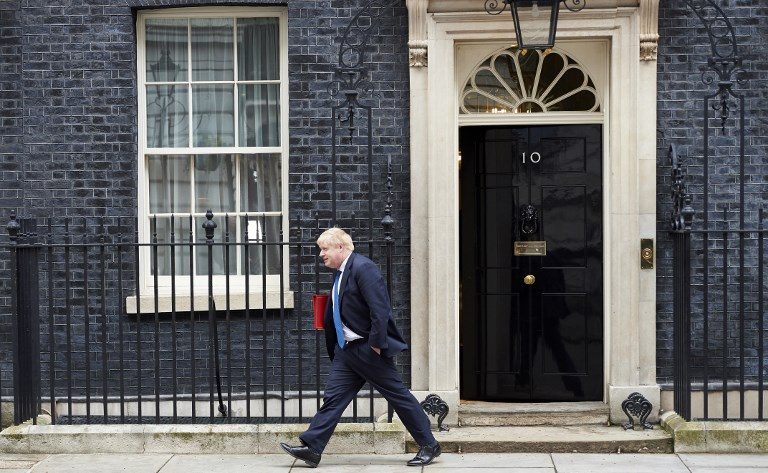SUMMARY
This is AI generated summarization, which may have errors. For context, always refer to the full article.

LONDON, United Kingdom (UPDATED) – British Prime Minister Theresa May faced down a backlash against her strategy for leaving the European Union on Monday, July 9, as both her Foreign Secretary Boris Johnson and Brexit minister David Davis resigned in protest.
Johnson warned in his letter of resignation to May that Britain was headed for the “status of colony” of the EU after it leaves in March, and said the Brexit “dream is dying”.
May responded that she was “sorry and a little surprised” by his decision but said she accepted it was necessary “if you are not able to provide the support we need to secure this deal in the interests of the United Kingdom”.
She replaced him with Health Minister Jeremy Hunt, a Japanese-speaking former entrepreneur who unlike Johnson voted for Britain to stay in the EU in the 2016 referendum.
Johnson’s dramatic resignation followed those of Davis and his deputy Steve Baker overnight over May’s plans to keep Britain economically close to the bloc.
Two parliamentary private secretaries – MPs who act as assistants to ministers – also quit their posts.
The departures, hailed by eurosceptic MPs in the ruling Conservative party, triggered speculation that May could face an imminent leadership contest.
But, appearing in the House of Commons, a confident-sounding May defended her Brexit proposals.
“This is not a betrayal,” she responded to one of several eurosceptic Conservative MPs who complained, insisting it was “the right Brexit deal for Britain”.
She later spoke to Conservative MPs in a closed-door meeting at which she reportedly received broad support.
Jacob Rees-Mogg, an influential Brexit hardliner, was quoted as saying that he would vote against May’s proposals but would support her in any confidence vote.
Rees-Mogg said he expected May to remain in office at least until the official date of Brexit next year.
But another Conservative MP Andrea Jenkyns said she believed May’s time as prime minister was “over”.
Davis himself said it would be “wrong” for his departure to trigger a major party rebellion against May.
‘Giving too much away’
May announced on Friday, July 6, that her cabinet had finally agreed to a plan to follow EU rules for trade in goods, raising hopes that long-stalled talks with the bloc could progress.
The truce did not last the weekend after Davis quit on Sunday night, July 8, warning that Britain was “giving too much away too easily” in Brexit talks.
On Monday, when Johnson was supposed to be hosting a summit on the Western Balkans, Downing Street announced he had also gone.
The timing could not be worse, as Britain faces a fresh diplomatic row with Russia over a nerve agent attack, and ahead of US President Donald Trump’s visit this week.
Brexit negotiations with Brussels are also expected to resume next week.
Downing Street swiftly appointed eurosceptic housing minister Dominic Raab to Davis’s job, and then later named Hunt as Johnson’s successor.
May said she now wanted to advance the Brexit talks, saying she had briefed EU leaders on her plan in recent days and received a “positive reaction”.
May has been balancing competing factions in her party for years, but with the clock ticking down to Brexit, had to make a choice.
Her proposal would see Britain adopt EU rules for trade in goods after Brexit, but maintain flexibility for its key services sector and end freedom of movement.
Brussels has repeatedly warned it will not accept “cherry-picking” of elements of its single market and it remains to be seen what the response will be in Brussels.
Following Monday’s resignations, EU President Donald Tusk tweeted: “Politicians come and go but the problems they have created for people remain.”
“I can only regret that the idea of Brexit has not left with Davis and Johnson. But… who knows?,” he added, wondering if Britain might reject the divorce.
‘Reluctant conscript’
But many eurosceptic MPs are outraged at May’s plan, and Davis’s resignation letter was also scathing.
May’s proposals for a “common rulebook” on goods “hands control of large swathes of our economy to the EU”, he said.
Davis said his job required “an enthusiastic believer in your approach, and not merely a reluctant conscript”.
Speaking to BBC radio on Monday, he said he hoped Britain would “resist very strongly any attempt to get any further concessions”.
As head of the Brexit ministry, Davis was the public face of Britain’s negotiating team but in reality has been overshadowed for months by May and her aides.
Opposition Labour leader Jeremy Corbyn said the cabinet ministers had “jumped the sinking ship”.
“For the good of this country and its people, the government needs to get its act together and do it quickly and if it can’t, make way for those who can,” he said. – Rappler.com
Add a comment
How does this make you feel?
There are no comments yet. Add your comment to start the conversation.